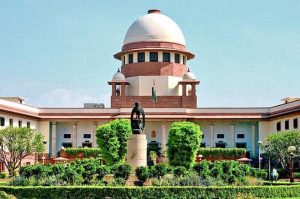 The government and the Supreme Court collegium are disagreeing on recommendations for judicial appointments quite frequently these days. Most recently, the apex court’s Collegium had rejected government’s objections and reiterated its recommendation to elevate Justices Aniruddha Bose and A S Bopanna to the apex court, observing nothing adverse has been found regarding their competence, conduct or integrity. The collegium also recommended names of Justices B R Gavai and Surya Kant for elevation to the apex court.
The government and the Supreme Court collegium are disagreeing on recommendations for judicial appointments quite frequently these days. Most recently, the apex court’s Collegium had rejected government’s objections and reiterated its recommendation to elevate Justices Aniruddha Bose and A S Bopanna to the apex court, observing nothing adverse has been found regarding their competence, conduct or integrity. The collegium also recommended names of Justices B R Gavai and Surya Kant for elevation to the apex court.
The two resolutions of the Collegium were made public on the apex court’s website on May 9. According to the website a five-member Collegium headed by Chief Justice Ranjan Gogoi had met on May 8 and deliberated on the issue of elevation of the four high court judges. “In view of the above, on due consideration of all aspects mentioned in the file, the Collegium resolves to reiterate the aforementioned recommendation dated 12th April, 2019, especially since nothing adverse regarding competence, conduct or integrity of Justices Aniruddha Bose, and A S Bopanna, has been pointed out,” the Collegium said in its May 8 resolution.
Justice Bose is the Chief Justice of Jharkhand High Court whereas Justice Bopanna is the Gauhati High Court Chief Justice. Justice Gavai is presently a judge of the Bombay High Court and Justice Kant is the incumbent Chief Justice of the Himachal Pradesh High Court. Against the sanctioned strength of 31 judges, the apex court is presently functioning with 27 judges.
For the second time in 12 months, the Supreme Court collegium had asserted itself against the executive on matters of judicial appointments and insisted on the elevation to the top court of two high court judges it has recommended, and proposed two more names, including the first Scheduled Caste nominee to the bench in a decade. The collegium, which comprises the five senior-most judges of the Supreme Court led by the Chief Justice of India, reiterated its April recommendation that Jharkhand high court chief justice Aniruddha Bose and Gauhati chief justice AS Bopanna be appointed to the apex court.
This is the second time in a year that the government and judiciary have locked horns over the appointment of judges. Last year, the government had locked horns with the judiciary, refusing to clear the name of Justice KM Joseph for elevation to the top court. The government cited two reasons for its decision: There were more senior judges who deserved elevation and the Kerala High Court was already adequately represented in the Supreme Court.
The opposition claimed that the judge was being targeted for ruling against imposition of President’s Rule in Uttarakhand three years ago. The government was forced to accept his
elevation when the collegium reasserted its choice and Justice Joseph took oath in August last year.
Once the Collegium reiterates its recommendation, the government has to accept it, although there is no prescribed time-frame within which this needs to be done. Clearing the names of justices Gavai and Kant for appointment, the collegium said: “While recommending the names of Justice Bhushan Ramkrishna Gavai and Justice Surya Kant, the Collegium has taken into consideration combined seniority on all-India basis of Chief Justices and senior puisne Judges of High Courts, apart from their competence, conduct and integrity. The Collegium has also kept in mind the desirability of giving due representation on the Bench of the Supreme Court, as far as possible, to all the High Courts as well as to all sections of the society including those belonging to SC/ST/OBC categories, women and minorities.“
With the recommendation of Justice Gavai to the Supreme Court, the top court has a Scheduled Caste judge on the bench after a gap of a decade. ST and OBC are short for Scheduled Tribe and Other Backward Class, respectively. Clearing the air that the recommendation of justice Gavai — he happens to be fourth with respect to seniority among judges from the Bombay high court — the collegium said: “His recommendation, in no way, is to be misconstrued to mean that three senior-most Judges from Bombay High Court (two of whom are serving as chief justices) are less suitable than Justice Gavai.”
It has become routine to hear that some recommendations for High Court appointments, as well as elevation to the Supreme Court, have met with disapproval from the government. In such instances, it requires reiteration by the collegium for the names to be cleared. This need not always be a cause for concern if it is a sign of some serious consultation on the suitability of those recommended.
However, it acquires the character of a controversy if the government’s objections suggest an oblique motive to thwart or delay the appointment of particular nominees.
The Supreme Court is keen to fill up the current vacancies. It has also recommended two more judges, Justice B.R. Gavai of the Bombay High Court and Chief Justice Surya Kant of the Himachal Pradesh High Court, for appointment to the apex court. If all these four recommendations go through, the court will have its full complement of 31 judges.
The process of filling up vacancies depends on the relative speed with which the collegium initiates proposals for appointments and makes its recommendations after internal deliberations, and the time the government takes to process the names.
As on May 1, the total number of vacancies in all the High Courts is 396. It is true that the filling up of vacancies is a continuous and collaborative process involving the executive and the judiciary, and there cannot be a time frame for it. However, it is time to think of a permanent, independent body to institutionalise the process.
The known inadequacies of the collegium system and the mystery over whether a new memorandum of procedure is in the offing are reasons why the proposal for a constitutionally empowered council to make judicial appointments ought to be revived — of course, with adequate safeguards to preserve the judiciary’s independence. The time may have come for a systemic and processual overhaul.
letters@tehelka.com












